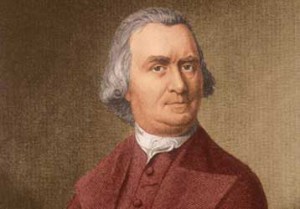Editor’s Note: Samuel Adams, American Patriot and Revolutionary Leader, was born on September 27, 1722. In celebration of his birth, the following are excerpts from one of his most famous speeches – in support of Independence on August 1, 1776.
Men who content themselves with the semblance of truth, and a display of words, talk much of our obligations to Great Britain for protection! Let us not be so amused with words: the extension of her commerce was her object. When she defended our coasts, she fought for her customers, and convoyed our ships loaded with wealth, which we had acquired for her by our industry. She has treated us as beasts of burden.
Let us also inquire against whom she has protected us? Against her own enemies with whom we had no quarrel, or only on her account, and against whom we always readily exerted our wealth and strength when they were required.
But what purpose can arguments of this kind answer? Did the protection we received annul our rights, and lay us under an obligation of being miserable?
Who among you would claim authority to make your child a slave because you had nourished him in his infancy?
It is a strange species of generosity which requires a return infinitely more valuable than anything it could have bestowed: that demands as a reward for a defense of our property, a surrender of those inestimable privileges, to the arbitrary will of vindictive tyrants.
Courage, then, my countrymen! Our contest is not only whether we ourselves shall be free, but whether there shall be left to mankind an asylum on earth, for civil and religious liberty?
From the day on which an accommodation takes place between England and America, on any other terms than as independent States, I shall date the ruin of this country.
When the spirit of liberty which now animates our hearts and gives success to our arms is extinct, our numbers will accelerate our ruin, and render us easier victims to tyranny.
If we love wealth better than liberty, the tranquility of servitude, than the animating contest of freedom—go from us in peace. We ask not your counsels or arms. Crouch down and lick the hands which feed you. May your chains set lightly upon you, and may posterity forget that ye were our countrymen.
To unite the supremacy of Great Britain and the liberty of America, is utterly impossible. So vast a continent and of such a distance from the seat of empire will every day grow more unmanageable. The motion of so unwieldy a body cannot be directed with any dispatch and uniformity, without committing to the Parliament of Great Britain powers inconsistent with our freedom. The authority and force which would be absolutely necessary for the preservation of the peace and good order of this continent, would put all our valuable rights within the reach of that nation.
As the administration of government requires firmer and more numerous supports in proportion to its extent, the burdens imposed on us would be excessive, and we should have the melancholy prospect of their increasing on our posterity.
If our posterity retain any spark of patriotism, they can never tamely submit to such burdens.
Other nations have received their laws from conquerors: some are indebted for a constitution to the sufferings of their ancestors through revolving centuries. The people of this country, alone, have formally and deliberately chosen a Government for themselves, and with open and uninfluenced consent, bound themselves into a social compact.
Thus by the beneficence of Providence, we shall behold our empire arising, founded on justice and the voluntary consent of the people, and giving full scope to the exercise of those faculties and rights which most ennoble our species.
Our Union is now complete; our constitution composed, established, and approved. You are now the guardians of your own liberties. We may justly address you, as the Decemviri did the Romans, and say— â€Nothing that we propose can pass into a law without your consent. Be yourselves, O Americans, the authors of those laws on which your happiness depends.â€
If I have a wish dearer to my soul, than that my ashes may be mingled with those of a Warren and Montgomery—it is—that these American States may never cease to be free and independent!

